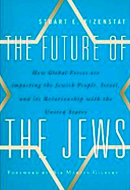Eizenstat on the Jewish Future

Stuart E. Eizenstat is, for many in the Jewish community, a household name—and deservedly so. Since his appearance on the national scene in 1976 as Jimmy Carter’s chief domestic policy adviser, Eizenstat has been U.S. Ambassador to the European Union, an Under Secretary of State, and a Deputy Secretary of the Treasury. When Bill Clinton was president, Eizenstat led negotiations with Switzerland, Germany, and Austria for the return of Jewish property to descendants of Holocaust victims; he is currently co-chair of the Jewish People Policy Planning Institute. Eizenstat’s experience as a participant in many of the international dramas of the past four decades and his intimate familiarity with Jewish affairs have left him well prepared to write a big book with the title The Future of the Jews: How Global Forces are Impacting the Jewish People, Israel, and Its Relationship with the United States.
The strongest chapter of this volume—the opening chapter, “A New Multipolar World”—consists of a country-by-country survey of changing economic, social, political, and military conditions in seven countries and regions (including China, of which he offers a superb analysis) that are increasingly important to both the United States and Israel. Eizenstat clearly intends to underscore, from the very beginning, the fact that Israel must pay heed to its major ally's foreign policy goals as it seeks to cultivate better relationships with these emerging powers.
The plot of The Future of the Jews thickens when, in subsequent chapters, Eizenstat evokes the dangers posed to Israel (and to Jews generally) by a radicalized Islam, globalization, anti-Semitism, and the continued campaign to delegitimize the Jewish state. Eizenstat brings an insider’s perspective to his analysis. Among other things, he reminds us of an oft-forgotten truth: the roots of the Israeli-Palestinian conflict pre-date the ascendancy of radical Islam.
Eizenstat distinguishes very clearly between criticism of Israel and anti-Semitism. While he considers even harsh criticism of the policies of the Israeli government to be entirely permissible, he regards questioning of the very legitimacy of Israel as tantamount to anti-Semitism. Eizenstat is sure-footed in his discussion of some of the domestic challenges to American Jews, but fuzzy on others. The most serious challenges confronting the American Jewish community today, he rightly states, are not anti-Semitism and other external threats but assimilation, a declining birthrate, and “out-marriage—Jews marrying non-Jewish spouses.” But Eizenstat does seem to rely on very high intermarriage statistics that most serious social scientists consider to be very dubious, such as the dramatic—and highly-touted—52 percent rate reported in the 1990 National Jewish Population Survey.
Unfortunately, after having set the stage at great length and very informatively for a discussion of the Jewish future, Eizenstat seems to run out of steam. In “Final Thoughts,” his peroration to the reader, he advocates nothing more original than a “two-state solution,” increased tolerance in Israel for internal dissent, new approaches toward dealing with Israel’s Arab minority and, finally—here Eizenstat is spot-on—creative approaches to the Jewish demographic weakness in the United States, including educational initiatives and a call to the organized Jewish community to adopt measures to reverse the stagnant Jewish birthrate.
According to Eizenstat, “Being born Jewish is no guarantee of staying Jewish or raising one’s children Jewish. It is not just non-Jews who must choose to be Jewish; it is those born Jewish as well.” But Eizenstat’s prescription—a “more open, accessible, welcoming, non-judgmental Judaism for anyone who wishes to identify as a Jew”—is utopian. It just isn’t going to happen. The best formula for Jewish continuity is not inclusiveness (desirable though that may be) but promoting functional Jewish literacy. Yet that, too, seems like a hopeless cause.
Where does this leave us? The transnational Jewish people is in flux, and Stuart Eizenstat understands the terms of the transition. Eizenstat has played and will continue to play a role during this era of worldwide change, in which Jewish destiny will evolve not in Europe but in the friendly competition between the sovereignty of Israel and the pluralism of America. The Future of the Jews, whatever its limitations, will serve as a useful resource for professionals and concerned citizens alike who are trying to understand the complexities of the Israel-Diaspora relationship in a changing world. If there is one phenomenon that characterizes the “future of the Jews,” it is Jewish reassessment—and Stuart Eizenstat gets it.
Jerome A. Chanes is a senior fellow at the Center for Jewish Studies of the CUNY Graduate Center and an adjunct professor of Jewish studies at CUNY. He is the author or editor of four books and numerous book chapters, articles, and reviews on Jewish history and public affairs.
Comments are closed for this article.




